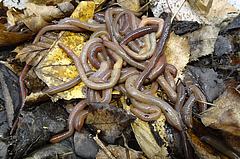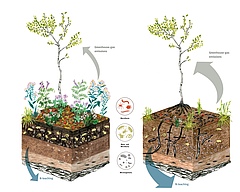Invasive earthworm erode soil biodiversity

European earthworms of the species Lumbricus terrestris. (photo: Simone Cesarz)

The figure shows the differences between soils with and without earthworms. (drawing: Friederike Arndt)
Note for the media: Use of the pictures provided by iDiv is permitted for reports related to this media release only, and under the condition that credit is given to the picture originator.
European earthworms are invasive in North America. Their impacts on local ecosystems are, however, still unclear. iDiv scientists and participants of the iDiv summer school 2016 (organized by yDiv) recently published that invasive earthworms are detrimental to soil biodiversity in North America. Using meta-analytic techniques, the authors report a consistent decline of soil invertebrate diversity and density in earthworm-invaded soils. Invasive earthworms were also detrimental to soil microorganisms, but only in the organic layer. These findings provide several new insights on how earthworm-free ecosystems change after the invasion of earthworms.
Publication
Ferlian, O, Eisenhauer, N, Aguirrebengoa, M, Camara, M, Ramirez-Rojas, I, Santos, F, Tanalgo,K, Thakur, MP (2017): Invasive earthworms erode soil biodiversity: A meta-analysis. Journal of Animal Ecology, DOI: 10.1111/1365-2656.12746
http://dx.doi.org/10.1111/1365-2656.12746Contact
Dr Madhav P. Thakur, Postdoc Experimental Interaction Ecology, phone +49 341 9733193,
https://www.idiv.de/en/groups_and_people/employees/details/eshow/thakur_madhav_prakash.html
Dr Olga Ferlian, Postdoc Experimental Interaction Ecology, phone +49 341 9733173,
https://www.idiv.de/groups_and_people/employees/details/eshow/ferlian-olga.html
Prof Nico Eisenhauer, Head of Research Group Experimental Interaction Ecology, phone +49 341 9733167,
https://www.idiv.de/en/groups_and_people/employees/details/eshow/eisenhauer_nico.html

